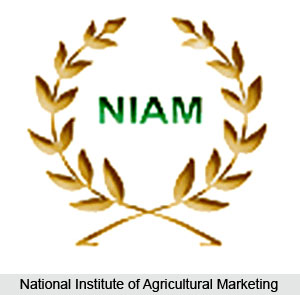 The National Institute of Agricultural Marketing (NIAM) is the nodal agency for implementation of training, extension and research programmes in Agricultural Marketing. NIAM is an autonomous body under the aegis of the Ministry of Agriculture, Government of India. It was set up as a Registered Society to cater to the needs of Agricultural Marketing personnel in India as well as from South East Asian countries. The NIAM, with its mission of imparting training to the various level functionaries involved in agricultural marketing activities and conducting consultancy research project for the sponsoring organizations, has been playing active role since its inception. The objective of the NIAM is, "To be a Centre of excellence to study and provide advice and assistance to public and private organisations, institutions, co-operatives and individuals in India as well as internationally on policy issues, trading and marketing of the highest quality with the ultimate objective for helping millions of farmers and functionaries in Agricultural Marketing."
The National Institute of Agricultural Marketing (NIAM) is the nodal agency for implementation of training, extension and research programmes in Agricultural Marketing. NIAM is an autonomous body under the aegis of the Ministry of Agriculture, Government of India. It was set up as a Registered Society to cater to the needs of Agricultural Marketing personnel in India as well as from South East Asian countries. The NIAM, with its mission of imparting training to the various level functionaries involved in agricultural marketing activities and conducting consultancy research project for the sponsoring organizations, has been playing active role since its inception. The objective of the NIAM is, "To be a Centre of excellence to study and provide advice and assistance to public and private organisations, institutions, co-operatives and individuals in India as well as internationally on policy issues, trading and marketing of the highest quality with the ultimate objective for helping millions of farmers and functionaries in Agricultural Marketing."
Orgainisation of NIAM
The Union Minister for Agriculture is the President of the General body of NIAM and Secretary, Department of Agriculture and Cooperation is the Chairman of the Executive Committee.
The Executive Committee consists of 12 members, nominated by the President from amongst the members of the General Body. The Executive Committee consists of the following members who shall hold office for the same duration for which the General Body is constituted: Secretary of the Ministry/Department of Agriculture & Cooperation, dealing with the Society; Chairman-Joint Secretary in charge of the Agricultural Marketing of the Ministry/Department of Agriculture & Cooperation, dealing with the Society; Vice-Chairman- Joint Secretary (Finance of the Ministry/Department of Agriculture & Cooperation, Government of India, dealing with Society; Member-Agricultural Marketing Advisor to -the Government of India; Member-Chairman, Council of Stat - Agricultural Marketing Boards; Member-Chief Secretary, Government of Rajasthan; Member- Director General, National Institute of Agricultural Marketing, Jaipur.
Areas of Activity
The NIAM focuses on following areas: Agricultural Marketing system in States; Post Harvest Loss Reduction Aspects; Information Technology Application in Agricultural Marketing; Future and Forward Markets and Commodity Exchanges; Food Safety, Quality Certification & Standardization; Legal Reforms; Market Infrastructure; Modern Terminal Market and their operations and management; Public-Private Partnership and Channel Partners; Ministry`s Programmes and their Capacity Building; Organic, Medicinal and Aromatic Plants; Coop Marketing; Market Led Extension; Sanitary and Phyto-Sanitary Measures; Grading, Standardization & Certification; WTO and Warehousing and Storage.




















